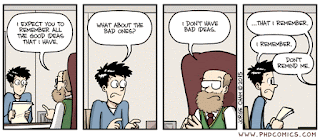Thursday, January 21, 2016
What should my Ph.D advisor expect from me?
The relationship between a Ph.D student and their advisor or supervisor is a complex one. I have written before about the importance of both parties having clear expectations and communicating and agreeing on them at the beginning of working together.
Over the years I have seen or heard of some strange things. Below is a list of some things that students have found their advisor expected.
work on my thesis topic
prepare a slide or two about my thesis work that they will present at a conference
write a small grant application for me to fund my travel to a conference
give feedback on their draft grant application that is related to my project
give one of their lectures while they are away at a conference
organise a weekly seminar series
act as de-facto supervisor for an undergraduate student research project that is not related to my project
maintain the group website
spend a morning on the registration desk for a conference they are organising
referee a paper or grant for them
perform maintenance duties around the lab
ignore an off-colour joke they make on just one occasion
maintain the group computing facilities
help paint the lab
"protect" them at all times
teach two weeks of their class while they are away
add "honorary" co-authors to a paper I wrote
provide data, calculations, or text for a paper which I will not be a co-author
prepare slides for a talk they will give that largely does not involve my thesis work
maximise citations to their papers, even when not relevant
promote their pet theories, even when I disagree
spend a whole week editing the abstract book for a conference they are organising
accept the job offer that they want me to take
not contradict them in public
submit a paper they have not read
write a whole grant application for them [see the second last paragraph here].
paint their house
come into the lab on a sunday morning
mow their lawn
babysit their children [Linus Pauling did!]
buy dinner for one of their visitors
listen to long monologues about their political or religious views or their personal life or departmental politics
not report unethical behaviour
let them confide deep personal struggles and emotional issues
let them post 86 poems about me on their Tumblr page
let them verbally abuse me
let them sexually harass me
have sex with them
The list starts off in a reasonable way and then steadily moves towards the unethical.
It is a slippery slope. Somewhere it moves from being a "team player" to working in a sweatshop, i.e. exploitation and abuse of power.
Where do you draw the line? Not everyone will agree on how far down the list the line should be drawn. I would probably draw it after the fourth item. Some of the lower items I might ask a student to do (sometimes with financial compensation), but not expect them to do it. Others will go a bit lower, perhaps particularly experimentalists.
I welcome comments.
How should students deal with this issue?
First, it is important to research an advisor before you sign up. Ask their current and former students. If there is "weirdness" involved find someone else. Don't think it will be any better for you. Second, if they seem o.k. agree on things before you start work.
Finally, if you are in an unacceptable situation get help. Don't endure it.
How should advisors deal with the issue?
See where you are on the list. Initiate discussions with your students.
Subscribe to:
Post Comments (Atom)
A golden age for precision observational cosmology
Yin-Zhe Ma gave a nice physics colloquium at UQ last week, A Golden Age for Cosmology I learnt a lot. Too often, colloquia are too speciali...

-
This week Nobel Prizes will be announced. I have not done predictions since 2020 . This is a fun exercise. It is also good to reflect on w...
-
Is it something to do with breakdown of the Born-Oppenheimer approximation? In molecular spectroscopy you occasionally hear this term thro...
-
Nitrogen fluoride (NF) seems like a very simple molecule and you would think it would very well understood, particularly as it is small enou...




No comments:
Post a Comment